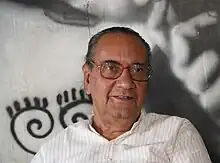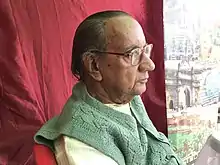Sudhir Chakravarti | |
|---|---|
 | |
| Born | 19 September 1934 Shibpur, Bengal Presidency, British India |
| Died | 15 December 2020 (aged 86) Kolkata, West Bengal |
| Occupation | Literary, teacher, educator, music specialist |
| Language | Bengali, India |
| Alma mater | B.A Krishnagar Government College, M.A. University of Calcutta, Ph.D. Jadavpur University |
| Notable works | Baul Fakir Katha Ganer Lilar Sei Kinare Sadar Mafaswal |
| Notable awards | Ananda Puraskar Sahitya Akademi Award (1985) Shiromani Award Acharya Dinesh Chandra Sen Award Narashinga Das Award Sarojini Basu Gold Medal |
| Spouse | Nivedita Chakravarti |
| Children | Sananda Chakravarti Sreya Chakravarti |
| Signature | |
Sudhir Chakravarti (19 September 1934 – 15 December 2020) was a Bengali educationist and essayist. He made a vast contribution in Bengal's folk culture development and research. Chakravarti had completely changed the style of colonial prose with his new narrative style. He successfully had replaced the prevailing idea of essay-based writing being something of heavy scholarly matter with his graceful and humorous prose language.
Early life and career
Sudhir Chakravarti or Sudhir Prasad Chakravarti was born on 19 September 1934 at Shibpur. His father's name was Ramaprasad Chakravarti and his mother Beenapani Chakravarti. He was the youngest of the nine sons of Ramaprasad. Due to the fear of the Japanese bombardings in Kolkata, Chakravarti's father had shifted to Dignagar, Nadia, (where they had ancestral lands as Zamindars) from Shibpur, Howrah in his childhood. After that his family came to Krishnanagar, Nadia.[1][2] Chakravarti completed his studies in Calcutta University. Chakravarti is known for his research works on Folk religion, Lalan Fakir and Cultural Anthropology in Bengal. He spent 30 years researching the folk culture by traveling to different villages all over the West Bengal.[3] He was a professor of Bengali literature since 1958 to 1994, but even after retirement kept on teaching until 2011. Chakravarti worked in Krishnagar Government College, guest lecturer of Jadavpur University and was also associated with the Institute of Development Studies, Kolkata. He wrote and edited more than 85 books on various subjects like music, art, folk-religion, cultural anthropology. He was the editor of Bengali literary Magazine Dhrubapada.[4] He died on 15 December 2020 in Kolkata.[5][6]
Literary career
From Rabindranath to Lalan Fakir, from Baul culture to clay modellers, modelling and painters and painting of rural Bengal, everything had become the subject of his interest and research. Besides research and writing, he has also being a prolific editor, his 'Dhruvapada' journal, which had 12 issues had created a sensation in the Bengali literary society.
His contribution to the study of Bengali folk culture is immense. His pen had authored immense detailed work on the sub-religions and cult of Kartabhaja, Balahari, Sahebdhani, their belief community and their songs, which were never paid much attention to by the intellectuals. It is to be noted that after William Hunter and Akshoy Kumar Dutta in the 18th century, few have paid attention to work on these sects. His book 'Bratya Lokayat Lalon' is considered as a milestone in the practice of Lalan Fakir.
He had collected songs of different communities in remote villages of Bengal by rigorous fieldwork, which makes him different from other researchers . He has recorded his research experience in folklore in the book 'Gabhir Nirjan Pathe'(Along deep lonely alleys) '. He won the Ananda Award in 2002 for his book 'Baul Fakir Kotha', and received Sahitya Akademi Award for the same in 2004.
He has also written books on Rabindra Sangeet and Music of Modern Bengal like 'Nirjan Ekaker Gaan: Rabindra Sangeet', 'Rabikarrekha', 'Elem Natun Deshe', 'Ganer Leela Sei Kinare', Preme Prana Gane '.Chakravarti in his time had stood to be one of the leading figure in Tagore study and Bengali Music. He was among the first man to embrace Suman Chattopadhyay 's new genre of Bengali Music. He had academically brought this new genre to the Bengali readers, this gave birth to Suman Chattopadhyay's book 'Sumaner Gaan Sumaner Bhasha. His famous column in 'Aajkal' on Music has discussed a varied range of music from the music of Rabindranath, Atulprasad, Iqbal to Shreya Ghosal, A. R Rahaman, all has been captured Chakravarti's range of work.
Works

1. Sahebdhani Sampraday O tader gaan (সাহেবধনী সম্প্রদায় তাদের গান), 1985
2. Ganer Lilar Sei Kinare (গানের লীলার সেই কিনারে), 1985
3. Krishnagarer Mritshilpo o Mritshilpi Samaj (কৃষ্ণনগরের মৃৎশিল্প ও মৃৎশিল্পী সমাজ), 1985
4. Balahari Sampraday o Tader Gaan (বলাহাড়ি সম্প্রদায় আর তাদের গান), 1986
5. Gabhir Nirjan Pathe (গভীর নির্জন পথে),1989
6. Dwijendralal Smaran Bismaran (দ্বিজেন্দ্রলাল রায় স্মরণ বিস্মরণ), 1989
7. Bangla Ganer Sandhane (বাংলা গানের সন্ধানে), 1990
8. Sadar -Mafaswal (সদর-মফস্বল), 1990
9. Agradwiper Gopinath (অগ্রদ্বীপের গোপীনাথ), 1992
10. Nirjan Ekaker Gaan Rabindrasangeet (নির্জন এককের গান রবীন্দ্র সংগীত),1992
11. Bangla Ganer char diganta (বাংলা গানের চার দিগন্ত), 1992
12. Bratya Lokayata Lalan (ব্রাত্য লোকায়ত লালন),1992
13. Chalchitrer Chitralekha (চালচিত্রের চিত্রলেখা), 1993
14. Bangla Filmer Gaan O Satyajit Ray (বাংলা ফিল্মের গান ও সত্যজিৎ রায়),1994
15. Nirbas (নির্বাস), 1995
16. Panchagramer Karacha (পঞ্চগ্রামের কড়চা), 1995
17. Paschimbanger Mela o Mohotsav (পশ্চিমবঙ্গের মেলা ও মহোৎসব), 1996
18.Debabrata Biswaser Gaan(দেবব্রত বিশ্বাসের গান), 1997
19. Lalan (লালন), 1998
20. Mati-Prithibir Tane (মাটি-পৃথিবীর টানে), 1999
21. Baul Fakir Katha (বাউল ফকির কথা),2001
22. Bangla Ganer Alokporbo (বাংলা গানের আলোকপর্ব),2001
23. Gane Gane Gaoya (গানে গানে গাওয়া),2003
24. Banglar Gounadharma : Sahebdhani O Bolahari (বাংলার গৌণধর্ম সাহেবধনী ও বলাহাড়ি), 2003
25. Rupe Barne Chande (রূপে বর্ণে ছন্দে),2003
26. Lekha Pora Kore Je (লেখা পড়া করে যে), 2003
27.Utsabe, Melay Itihase (উৎসবে মেলায় ইতিহাসে), 2004
28. Ghanaran Bahirana (ঘরানা বাহিরানা),2006
29. Kabitar Vichitra Pathe (কবিতার বিচিত্রপথে), 2006
30. Gaan Hote Gaane (গান হতে গানে),2008
31. Lokayoter Antarmohol (লোকায়তের অন্তরমহল), 2008
32. Shamuk Jhinuk (শামুক ঝিনুক), 2009
33. Akhyaner Khoje (আখ্যানের খোঁজে),2009
34. Loksomaj O Lokchitra (লোকসমাজ ও লোকচিত্র), 2009
35. Rabindranath Anekanta (রবীন্দ্রনাথ অনেকান্ত), 2010
36.Nirjansajane (নির্জনসজনে), 2011
37. Alaldost Sevakamalini lalan (আলালদোস্ত সেবাকমলিনী লালন),2011
38.Manini Rupmati Kubir Gosai (মানিনী রূপমতী কুবির গোঁসাই), 2012
39. Kabitar Khonje (কবিতার খোঁজে),2012
40. Dekha na Dekhaye Mesha (দেখা না দেখায় মেশা),2012
41. Sudhir Chakravarti Rachanavali -1 (সুধীর চক্রবর্তী রচনাবলি-প্রথম খণ্ড),2012
42. Sudhir Chakravarti Rachanavali -2 (সুধীর চক্রবর্তী রচনাবলি- দ্বিতীয় খণ্ড),2013
43. Chorano Ei Jibon (ছড়ানো এই জীবন),2013
44. Bhadrajaner Drishtite Lalan Fakir (ভদ্রজনের দৃষ্টিতে লালন ফকির), 2013
45. Sahityer Lokayata Path (সাহিত্যের লোকায়ত পাঠ), 2013
46. Anek Diner Anek Katha (অনেক দিনের অনেক কথা), 2013
47. Abataler Rupabali Abataler Padabali (অবতলের রূপাবলি, অবতলের পদাবলি), 2013
Awards
Chakravarti received the Ananda Purashkar in 2002 for his book Baul Fakir Katha and the Sahitya Akademi Award 2004.[7] He got the awards of Eminent Teacher from Calcutta University in 2006,[8] Narasimha Das award Medal from Delhi University and the Dr. Sukumar Sen Gold Medal from the Asiatic Society. He has also been awarded by the Tagore research Institute the title of Rabindratatvacharya.
References
- ↑ "কোথায় গেল সে সব আশ্চর্য পড়শিরা". anandabazar.com (in Bengali). Retrieved 27 April 2018.
- ↑ হালদার, সুস্মিত. "রোজ পৌঁছতেন কাঠিবনে". www.anandabazar.com (in Bengali). Retrieved 8 March 2021.
- ↑ "Their music inspired Tagore, Bob Dylan: This book tells you all about Bauls of Bengal". Hindustan Times. 4 October 2017. Retrieved 27 April 2018.
- ↑ "Dr. Sudhir Chakraborty". nadia.gov.in. Retrieved 27 April 2018.
- ↑ MP, Team (16 December 2020). "Sahitya Akademi awardee Sudhir Chakraborty passes away". www.millenniumpost.in. Retrieved 16 December 2020.
- ↑ "লোকসংস্কৃতি গবেষক সুধীর চক্রবর্তী প্রয়াত". anandabazar.com (in Bengali). Retrieved 16 December 2020.
- ↑ "AKADEMI AWARDS (1955–2016)". sahitya-akademi.gov.in. Retrieved 27 April 2018.
- ↑ "Recipient of Eminent Teacher Awards". Retrieved 27 April 2018.